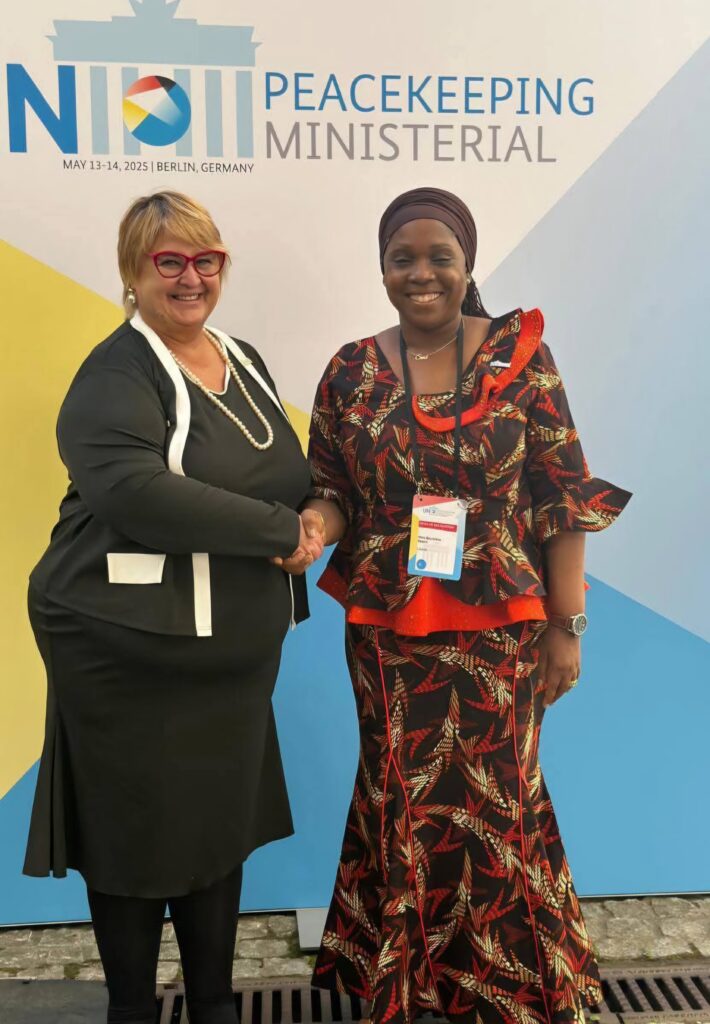Foreign Minister Sara Beysolow Nyanti has highlighted Liberia’s transformation from conflict to peace, acknowledging the instrumental role of international peacekeeping missions.
She made the remarks in Berlin, Germany during a high level peacekeeping conference.
Liberia she told the international peacekeeping gathering is a living example of what peacekeeping can achieve.
According to her, Though Liberia’s peace is fragile, it is resilient.
Minister Nyanti stated that Liberia has the responsibility to share what it has learned in order help shape a more effective, inclusive future for global peace efforts.
Speaking further, the Dean of the cabinet told the gathering that there is a lot to learn from the Liberian society in relation to peacebuilding because, Liberia has firsthand experience.
She at the same time pledged Liberia’s support to peacekeeping indicating that Liberia will continue to support with field military officers and observers and deployment of police, but Liberia will add one base defense command, one quick reaction command and one mobile command.
The pledge was made in consultation with Deputy Minister Augustine Lamin and Police Commissioner Johnny Dean as well as the rest of the delegation including Ambassador Youngor Telewoda.
Minister Nyanti also pledged Liberia’s availability to use its lessons learned to provide an evidence base for UN Peacekeeping reforms.
The Liberian foreign Minister joined foreign ministers, defense officials, and international partners to shape the next generation of peacekeeping and peacebuilding strategies held in Berlin, Germany.
The conference, co-convened by the Minister of Foreign Affairs of Germany and the country’s Minister of Defense in partnership with the United Nations, was held to discuss global peace efforts and the evolution of multilateral engagement in conflict-prone regions, featured high-level panels and bilateral discussions.
Liberia, a country with a history of being a recipient of peacekeepers and now a troop contributing country used the platform to advocate for reforms in peace operations and to emphasize its candidacy for a non-permanent seat on the United Nations Security Council (UNSC).
“When missions leave, expectations linger, yet the support structures often do not”, she noted.
She indicated that economic gap left behind is real and long-lasting.
Foreign Minister Nyanti stressed that although UNMIL is hailed as one of the most successful peacekeeping missions, a review of peacekeeping must not only look at what has worked, but also take a deep dive into the gaps and shortcomings.
Madam Nyanti said that a narrow focus on mental health during DDRR processes left a traumatized society where communities were not given enough support to receive and help reintegrated soldiers.
These lessons, she said, will help to shape the future of peacekeeping in making it fit for purpose.
Amb. Nyanti wants peacebuilding to go beyond immediate stabilization, emphasizing the need for comprehensive, long-term strategies.
She also called for the inclusion of diaspora communities, more transparent funding practices, and community-driven programming to foster sustainable peace.
The panel also featured the Minister of Foreign Affairs of Germany, Minister of Foreign Affairs of Bangladesh and the UN Assistant Secretary General for Peacekeeping.
She stressed that she is the only Liberian to have served as a national staff of the UN during a very difficult conflict and post-conflict period to then rise to the triple hatted role of Deputy Special Representative of the UN Secretary General in a peacekeeping mission while also serving as UN Resident Coordinator and Humanitarian Coordinator at the same time.
Such she pointed out provides perspective that is valuable in shaping the future of peacekeeping looking at lessons from the bottom to the top.
At the same time, Foreign Minister Nyanti also held a bilateral meetings with Brig. Gen (Rtd) Levi, Deputy Minister of Defense of Zimbabwe, Minister of Foreign Affairs of Eswatini, Slovak Foreign Ministry, Elizabeth Spehar, Assistant Secretary General for Peacebuilding, State Minister for Foreign Affairs of Germany, Minister of Foreign Affairs of Sri Lanka and Bangladesh, as well as their defense teams and several others.
Discussions centered around Liberia’s bid for a non-permanent seat on the UN Security Council with many expressions of support not only for the vote, but for training such as offered by Germany.
Eswatini sought Liberia’s support and guidance for the AU peace and security council, while Sri Lanka, Bangladesh and Zimbabwe look to deepen relations through bilateral cooperation and sighing of a Joint Commission.
Outlining Liberia’s priorities for its UNSC bid, Minister Nyanti identified key thematic areas, Women Peace and Security, Youth Peace and Security, Climate Change, Natural Resources management and the Conflict Nexus, Regional Collaboration through the Mano River Union (MRU), Reform of the UN Security Council to include Peacekeeping, Peacebuilding and development.
Meanwhile, Liberia continues to demonstrate its commitment to multilateralism and regional solidarity, citing the foundational support of ECOWAS and the United Nations during its time of crisis.


